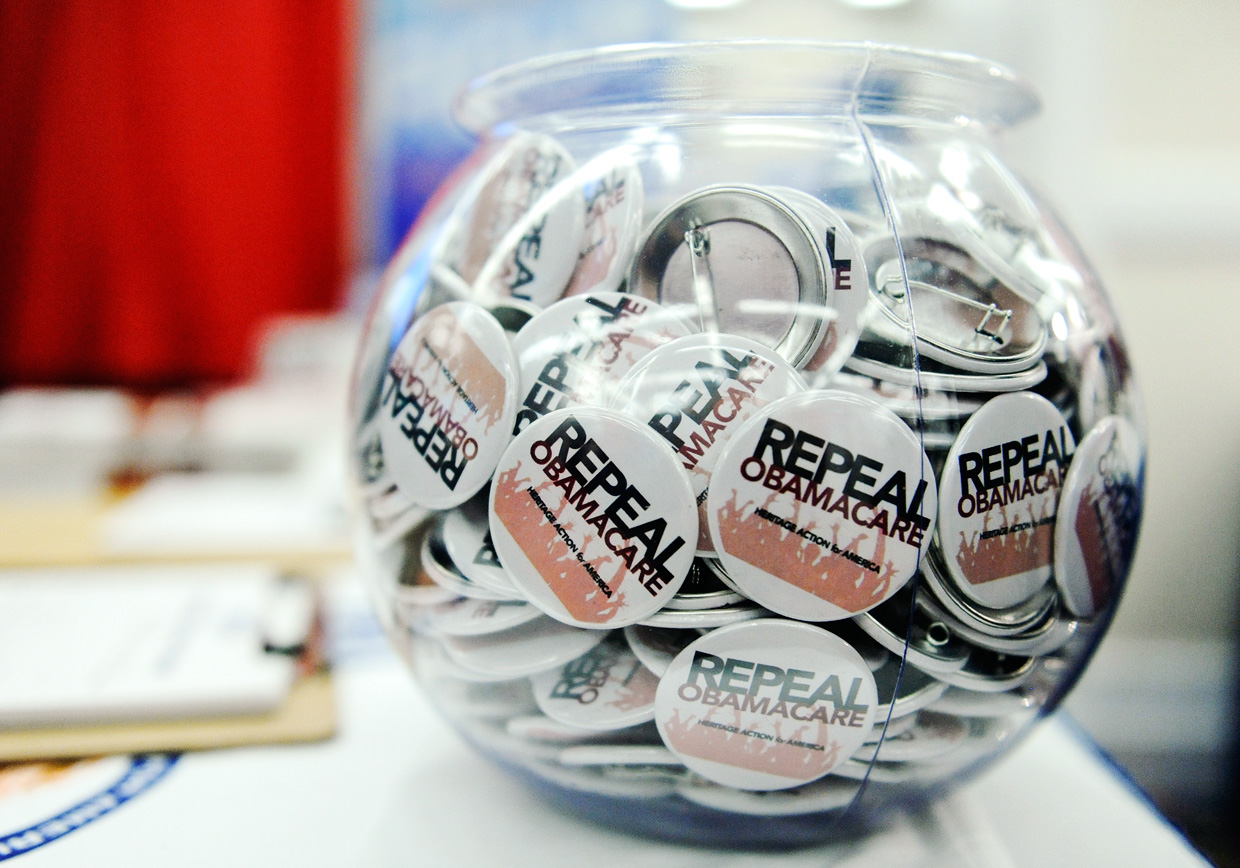Hobby Lobby is heading toward D.C. this year—but it won't be to set up shop for craft-staved Washingtonians. Rather, the evangelical-owned retail craft chain aims to appear before the Supreme Court in 2014.
Days before the Affordable Care Act's health insurance exchanges opened enrollment October 1, the craft-chain giant got an unexpected boost . The government itself appealed to the high court and asked it to hear the case regarding the ACA employer-provided contraception mandate.
That's good news for Hobby Lobby, as well as the plaintiffs in 71 other lawsuits pending against the ACA, says Mark Rienzi, senior legal counsel for The Becket Fund for Religious Liberty.
"When the solicitor general asks a court to take a court in which some federal law has been found invalid, as in the Hobby Lobby case, the court usually takes that," he said. "If they take the case, they're going to have to resolve the religious liberty claim."
According to the government's Hobby Lobby petition, the Supreme Court must decide whether or not a for-profit corporation can "deny its employees the health coverage of contraceptives … based on the religious objections of the corporation's owners."
The move was unusual for the government, which hasn't pushed back in the majority of cases when judges granted injunctions, says Kim Colby, senior counsel for the Christian Legal Society (CLS).
Until the Hobby Lobby case, the government had pushed back only in one particular case, Gilardi v. Sebellius, in order for it to become the "test case for the D.C. Circuit," Religion Clause's Howard Friedman noted earlier this summer.
The government's hopes for Gilardi could be moot now, because Hobby Lobby isn't the only religiously owned company waiting to hear back from the Supreme Court. Conestoga Wood Specialties also petitioned the Supreme Court against the mandate, asking the court to review a separate ruling that failed to grant the Mennonite-owned company relief from the mandate.
And with two open appeals before the Supreme Court, supporters of both sides will be quick to throw their weight behind either case if only one is accepted for review.
Hobby Lobby's owners—as well nearly 40 other for-profit plaintiffs who have filed suit—believe the ACA's requirement to cover the cost abortifacient contraceptives violates their religious freedom. That's an argument also being made by CLS, the National Association of Evangelicals (NAE), and the Southern Baptist Ethics and Religious Liberty Commission (ERLC), all of which have jointly filed friend-of-the-court brief supporting both Hobby Lobby and Conestoga.
"We want the courts to know that this is not an area in which the administration has taken care of the religious organizations," said Kim Colby, legal counsel for CLS. "We're saying … the whole mandate is an unprecedented assault on religious liberty in this country. We want the courts to know that this alleged accommodation is not adequate."
The amicus brief argues that the cases before the Supreme Court are not "about which religious viewpoints regarding contraceptives or abortion are theologically correct, but whether America will remain a pluralistic society that sustains a robust religious liberty for Americans of all faiths."
So far, judges mainly are lining up in favor of religious freedom. According to the Becket Fund for Religious Liberty, which represents Hobby Lobby, "To date, of the 32 for-profit plaintiffs that have obtained rulings touching on the merits of their claims against the mandate, 29 have secured injunctive relief against it."
But most of these judges have declined to tackle the key question of corporate personhood—that is, whether or not a for-profit employer can exercise religious conscience on behalf of its owners. That reticence could benefit the plaintiffs like Hobby Lobby: Given the number of lawsuits—and possibly more on the way—it would be foolish not to address them once and for all, Colby said.
Colby suspects the Supreme Court will accept both cases. "If they take Hobby Lobby … that would mean they'd have to address the whole issue of substantial burden and compelling government interest," she said.
A Supreme Court ruling could offer the authoritative voice that the companies seek—and relatively soon. If justices grant review to either case, it is "highly likely that the Supreme Court will decide the issue in the upcoming term," Becket stated in a press release. That means a final decision on the contraception mandate could come as soon as June 2014.
"Whatever the answer is, it's probably good if we hear from the Supreme Court soon rather than suffer through 70-plus lawsuits over the next years," Rienzi said.
Such a ruling would come nearly one year after HHS issued what it said was its final rule on the mandate in June 2013. The rule released at that time defined a "religious employer" and didn't provide a religious liberty exemption to for-profit companies like Hobby Lobby and Conestoga. (The 6th Circuit Court of Appeals upheld that definition last month when it ruled against Autocam, a Michigan-based auto manufacturing company with religious owners.)
But the government's definition also failed to placate some non-profit plaintiffs who still don't qualify because they are not direct ministries of a church. One such ministry is Little Sisters of the Poor, an order of Catholic nuns, who filed a class-action lawsuit on Tuesday.
"Their claims are asserted not just on behalf of Little Sisters but all other catholic organizations that get insurance through Christian Brothers Services," Rienzi said. "There's the possibility of getting relief for hundreds of organizations all at once."
Little Sisters of the Poor is exempt at the moment under an existing "safe harbor" clause, but those protections end on Jan. 1, 2014. Once that safe harbor clause runs out, nonprofits will face the same, steep fines as their for-profit counterparts.
As a result, non-profit plaintiffs, including Ave Maria University, Westminster Theological Seminary, and the Washington Catholic Archdiocese, are beginning to re-file their complaints. Southern Nazarene, Oklahoma Wesleyan, Oklahoma Baptist, and Mid-America Christian Universities filed a similar case last weekend.
All of these plaintiffs allege that the government's "compromise for religious non-profit organizations that object to furnishing contraceptive coverage is insufficient," Religion Clause states.
CT previously has reported extensively on the battles over the ACA's contraception mandate, including running coverage of the Hobby Lobby case as it moved through the courts. Notably, CT explored the question of corporate personhood and religious rights in both February and May.
CT also rounded up the wave of contradictory court rulings released as fines over the contraceptive mandate were scheduled to begin. Hobby Lobby, among the many surprising Christian organizations suing the government, previously lost its bid for an injunction before the Tenth Circuit Court of Appeals, as well as its subsequent request for a temporary restraining order before the United States Supreme Court.







